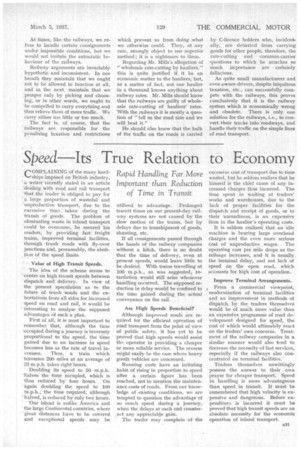Speed Its True Relation to Economy C OMPLAINING of the many
Page 49

If you've noticed an error in this article please click here to report it so we can fix it.
hardships imposed on British industry, a writer recently stated in an article 'dealing with road and rail transport that the trader is obliged to pay for a large proportion of wasteful and unproductive transport, due to the excessive three taken during the transit of goods. The problem of eliminating waste in inland transport could be overcome, he assured his readers, by providing fast freight trains, improved terminal facilities, through trunk roads with fly-over junctions and, presumably, the abolition of the speed limits.
Value of High Transit Speeds.
The idea of the scheme seems to centre on high transit speeds between dispatch and delivery. In view of the present speculation as to the future of trunk h=oads and the exhortations from all sides for increased • speed on road and rail, it would be interesting to analyse the supposed advantages of such a plan.
First of all, it is most important to remember that, although the time occupied during a journey is inversely proportional to the speed, the time gained due to an increase in speed becomes less as the rate of travel increases. Thus, a train which • traverses 200 miles at an average of 25 m.p.h. takes eight hours. " Doubling its speed to 50 m.p.h.
• 'halves the time occupied, which is thus reduced by four hours. On • again doubling the speed to 100 m.p.h., the time required, although halved, is reduced by only two hours.
• Our island is unlike America and the large Continental countries, where great distances have to be covered and exceptional speeds may be utilized to advantage. Prolonged transit times on our present-day railway systems are not caused by the slow motion of the trains, but by delays due to transhipment of goods, shunting, etc.
If all consignments passed through the hands of the railway companies
without a hitch, there is no `doubt that the time of delivery, even at present speeds, would leave little to be desired. With trains travelling at 100 m.p.h., as was suggested, retardation would still arise whenever handling occurred. The supposed reduction in delay would be confined to the time gained during. the actual conveyance on the rail.
Are High Speeds Beneficial?
Although improved roads are required for the efficient operation of road transport from the point of view of public safety, it has yet to be proved that high speeds would assist the operator in providing a cheaper or more reliable service. The reverse might easily be the case where heavy goods vehicles are concerned.
Running costs have an irritating habit of rising in proportion to speed after a certain figure has been reached, not to mention the maintenance costs of roads. From our knowledge of existing conditions, we are tempted to question the advantage of so much speed during a journey, when the delays at each end counteract any appreciable gain.
The trader may complain of • the excessive ccist of transport due to time wasted, but he seldom realizes that he himself is the chief cause of any increased charges thus incurred. The time spent in waiting at traders' works and warehouses, due to the lack of proper facilities for the dispatch and receipt of goods, or to their unreadiness, is an expensive item in the haulier's operating costs.
It is seldom realized that an idle machine is bearing large overhead charges and the even more serious cost of unproductive , wages. The operating cost per mile drops as the mileage increases, and. it is usually the terminal delay, and not lack of speed on the open road, which accounts for high' cost of operation. .
Improve Terminal Arrangements.
• From a commercial viewpoint, modernization of terminal facilities and an improvement in methods of dispatch by the traders themselves would be of much more value than an expensive programme of road development designed for speed, the cost of which would ultimately react on the traders' own concerns. Treatment of the 'railway companies in a similar manner would also tend to decrease the necessity of fast services, especially if the railways also concentiated on terminal facilities. Traders themselves unwittingly possess the answer 'to their own prayer for cheaper transport. Speed in handling is more advantageous than speed in transit. It must be remembered that high velocity is expensive and dangerous. Before expenditurc is incurred it must be proved that high transit speeds are an absolute necessity for the economic operation of inland transport. nal




































































































